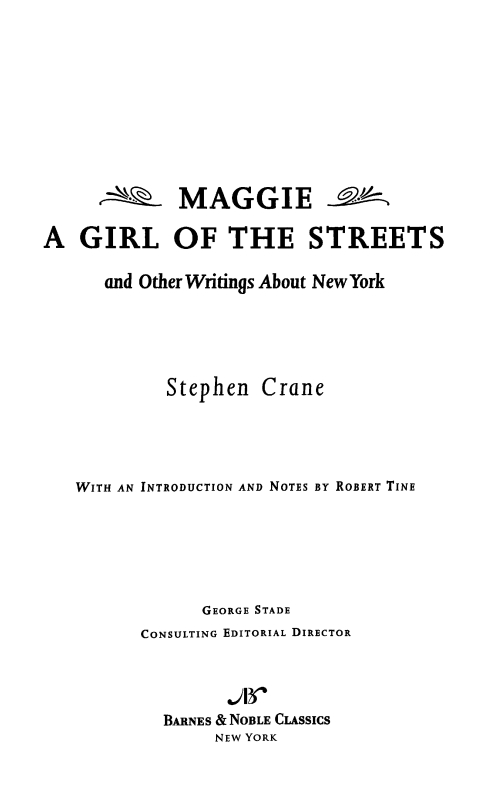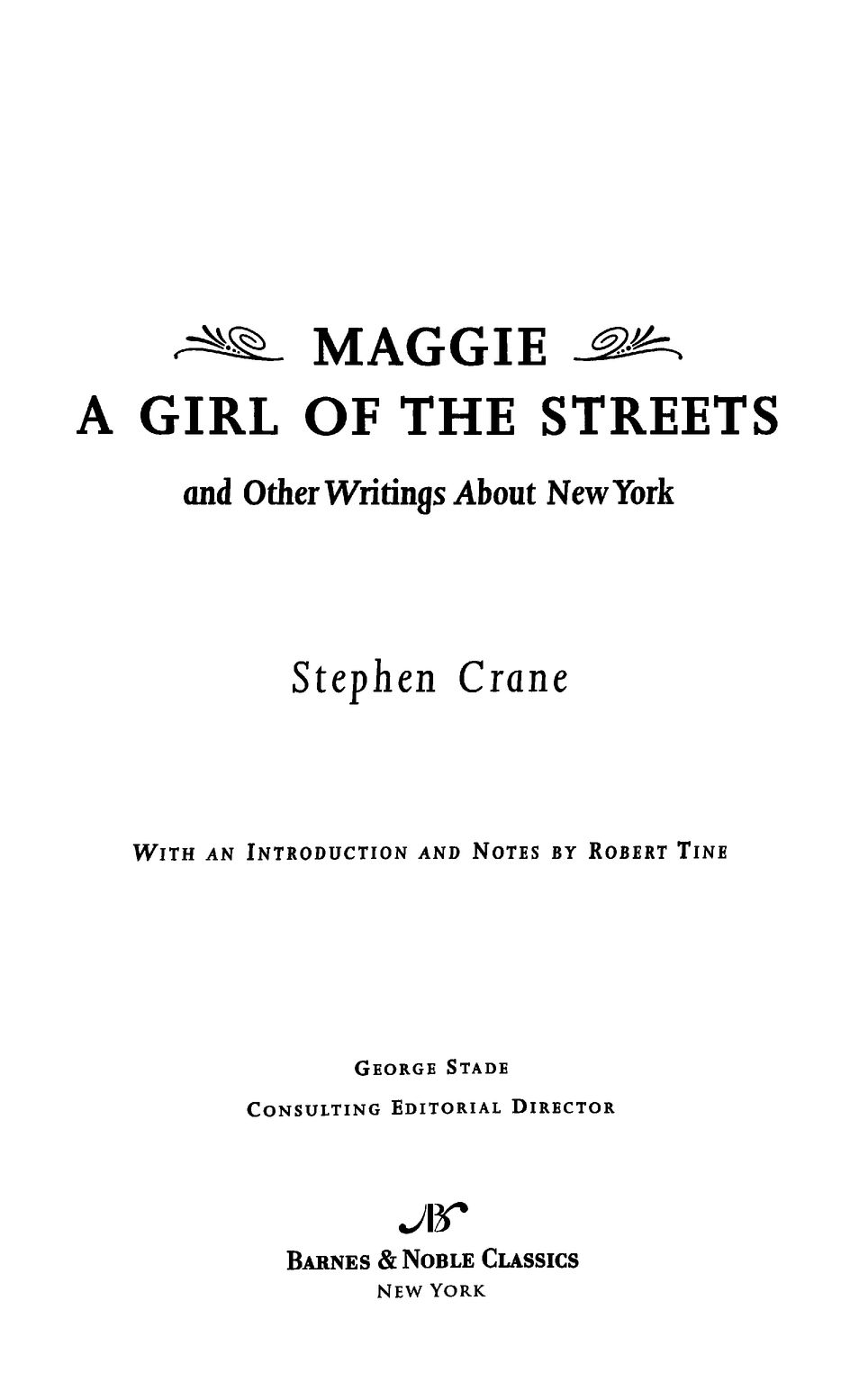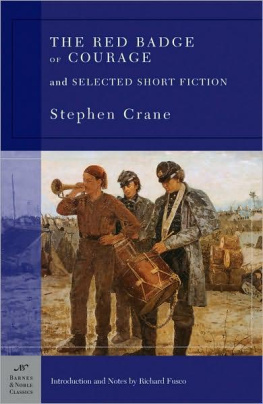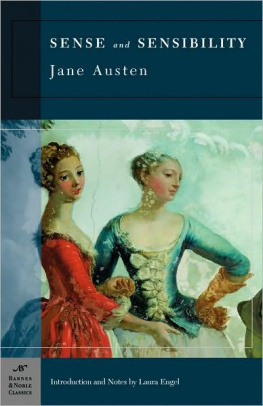
Table of Contents
FROM THE PAGES OF MAGGIE: A GIRL OF THE STREETS and Other Writings About New York
A stone had smashed into Jimmies mouth. Blood was bubbling over his chin and down upon his ragged shirt. Tears made furrows on his dirt-stained cheeks. His thin legs had begun to tremble and turn weak, causing his small body to reel. (from Maggie, pages 7-8)
The girl, Maggie, blossomed in a mud puddle. She grew to be a most rare and wonderful production of a tenement district, a pretty girl.
(from Maggie, page 22)
Teh hell wid him and you, she said, glowering at her daughter in the gloom. Her eyes seemed to burn balefully. Yehve gone teh deh devil, Mag Johnson, yehs knows yehs have gone teh deh devil. Yer a disgrace teh yer people, damn yeh. (from Maggie, page 39)
As the girl timidly accosted him, he gave a convulsive movement and saved his respectability by a vigorous sidestep. He did not risk it to save a soul. For how was he to know that there was a soul before him that needed saving? (from Maggie, page 64)
I know he aint th kind a man Id like t have you go around with. He aint a good man. Im sure he aint. He drinks.
(from Georges Mother, page 82)
He remembered Jones. He could not help but admire a man who knew so many bartenders. (from Georges Mother, page 93)
For three days they lived in silence. He brooded upon his mothers agony and felt a singular joy in it.
(from Georges Mother, page .119)
From the dark and secret places of the building there suddenly came to his nostrils strange and unspeakable odors that assailed him like malignant diseases with wings. They seemed to be from human bodies closely packed in dens; the exhalations from a hundred pairs of reeking lips; the fumes from a thousand bygone debauches; the expression of a thousand present miseries.
(from An Experiment in Misery, page 138)
I have been told all my life that millionaires have no fun, and I know that the poor are always assured that the millionaire is a very unhappy person. (from An Experiment in Luxury, pages 145-146)
Humanity only needs to be provided for ten minutes with a few whirligigs and things of the sort, and it can forget at least four centuries of misery. I rejoice in these whirligigs.
(from Coney Islands Failing Days, page 165)
And who should invade this momentary land of rest, this dream country, if not the people of the Tenderloin; they who are at once supersensitive and hopeless, the people who think more upon death and the mysteries of life, the chances of the hereafter than any other class, educated or uneducated? Opium holds out to them its lie, and they embrace it eagerly. (from Opiums Varied Dreams, page 195)
The bicycle crowd has completely subjugated the street. The glittering wheels dominate it from end to end. The cafes and dining rooms or the apartment hotels are occupied mainly by people in bicycle clothes. Even the billboards have surrendered.
(from New Yorks Bicycle Speedway, page 196)

STEPHEN CRANE
Stephen Crane was born on November 1, 1871, the fourteenth and last child of the Reverend Jonathan Townley Crane and Mary Helen Peck, a Methodist missionary. Stephens interest in war and the military developed early, and he convinced his mother to enroll him in the Hudson River Institute, a semi-military school in upstate New York. On the advice of a professor who urged him to pursue a more practical career than the army, Stephen transferred to Lafayette College in Pennsylvania, to study mining engineering; however, he seldom attended class and failed a theme writing course because of poor attendance. His formal education ended after one semester at Syracuse University, where he was known on campus for his baseball skills. Despite his unimpressive academic performance, he wrote regularly while he was a student.
Stephen Crane became a prolific writerof journalism and novels, short stories and poetry. By age twenty-three he had completed two major novels marked by an impressionism and a psychological realism that anticipated the new fiction of Ernest Hemingway, F. Scott Fitzgerald, and William Faulkner. His writing of fiction is informed by the keen, precise observation that also made him a journalist; for Maggie: A Girl of the Streets (1893), he shadowed a New York prostitute for weeks. Crane was born after the Civil War, and he relied on secondary sources and his own intuition and emotional insights in creating The Red Badge of Courage (1895), the story of a young recruits experiences during one key battle. The book is often cited as the first modern novel.
While on assignment to cover the Cuban-Spanish conflict that preceded the Spanish-American war, Crane met his lifelong companion, Cora Stewart, a well-read daughter of old money who owned a brothel in Jacksonville, Florida. Crane and Stewart later lived in England, where they socialized with Henry James, Joseph Conrad, and Ford Madox Ford, who admired Cranes unique writing style. The young American continued to publish novels, stories, and articles for journals, which solidified his reputation.
Illness cut Cranes life short. In 1899, in Badenweiler, Germany, he collapsed with severe hemorrhaging of the lungs brought on by tuberculosis and malaria. He died in a sanitarium on June 5, 1900, five months before his twenty-ninth birthday.
In his short but brilliant career, Stephen Crane produced six novels, two collections of poetry, and more than one hundred stories, which were compiled in a ten-volume edition published by the University Press of Virginia (1969-1976). He is remembered as a pioneering writer who anticipated the styles that modernized American literature in the 1920s.
THE WORLD OF STEPHEN CRANE AND HIS WRITINGS ABOUT NEW YORK
| 1871 | Stephen Crane is born on November 1 at 14 Mulberry Street, Newark, New Jersey, the last of his parents fourteen children. |
| 1878 | Stephen enrolls in school. His father becomes pastor of the Drew Methodist Church in Port Jervis, in upstate New York. |
| 1880 | Stephens father dies of heart failure. |
| 1883 | Stephen and his mother move to Asbury Park, a town on the New Jersey coast. |
| 1885 | Concerned about Stephens digressions from Methodist teachings , his mother enrolls him at Pennington Seminary, a school where his father had once been the principal. He writes his first story, Uncle Jake and the Bell-Handle. Stephen becomes intrigued by the battles of the Civil War and decides to pursue a career in the army. |
| 1888 | In January, Stephen enrolls at the Hudson River Institute, a semi-military school in upstate Claverack, New York. He works as a gossip reporter for his brother Townleys news agency; his vignettes appear in On the Jersey Coast, a column in Townleys New York Tribune. |
| 1890 | In February, Stephens first signed publication, an essay on the Christian virtues of Sir Henry Morton Stanleys African expedition , appears in the school magazine. In September, he enrolls at Lafayette College, in Pennsylvania, to pursue a more practical profession, mining engineering. He does poorly in his studies and fails a course in theme writing. After one semester, he withdraws from Lafayette. Rudyard Kiplings The Light That Failed, |








